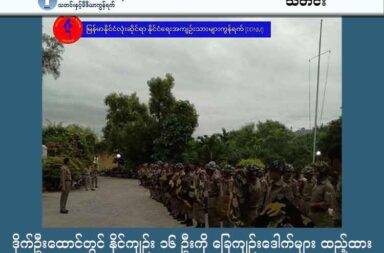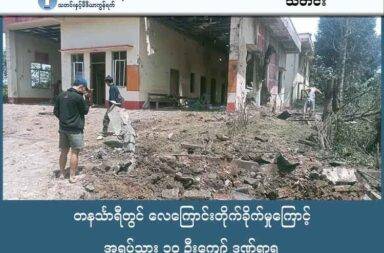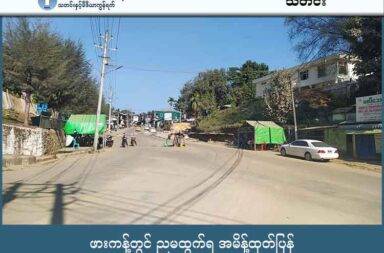Tatmadaw Filed the Most Lawsuits Threatening Freedom of Expression, Report Says
By NETWORK MEDIA GROUP (NMG)
Thursday, January 9, 2020
The Burma Army filed 47 lawsuits against 96 people in which they attempted to limit freedom of speech over the last four years—more than any other actor, according to civil society organization Athan.
On Tuesday, Athan reported that the Tatmadaw had used Penal Code articles 200, 500, 505(a) and (b), and the peaceful assembly law, illegal communications act, telecommunications law and the media law to bring cases against people for speaking out against the military.
“What we mainly found is that many activists are prosecuted for their criticism of the Tatmadaw. Secondly, civilians are [also] prosecuted for their criticism of the Tatmadaw,” Ye Wai Phyo Aung, the manager of Athan’s research team, told NMG.
The period of time for Athan’s study was the 45 months from April 2016 until December 2019—the time since the National League for Democracy government took power. During that time, the military filed lawsuits against 51 activists, 19 civilians, 14 journalists, five religious leaders, four artists and three politicians.
“The Tatmadaw filed lawsuits against civilians in Yangon, Karenni [Kayah State], and other states and regions. The Tatmadaw filed lawsuits against journalists at the Irrawaddy, DVB, RFA and Kantarawaddy Times as well as other media outlets,” Ye Wai Phyo Aung said, adding that the charges against those in the media extended to editors, columnists and news outlet owners.
The Karenni State Farmer’s Union (KSFU) said that the Burma Army has filed lawsuits against 41 farmers, 11 of whom are detained in prison.
KSFU chairperson Tu Reh said that the Tatmadaw filed a lawsuit against 10 Karenni farmers last December, alleging that they trespassed on military land by trying to reclaim land that had been confiscated from them.
Ye Wai Phyo Aung confirmed that Athan had taken note of the case, which involves farmers from Dawmukalar and Myaenigon villages, as well as KSFU staff.
One of Athan’s findings was that Tatmadaw lawsuits against activists have increased dramatically this year. In 2016, nine percent of such lawsuits were filed by the army. By 2017, this was 23 percent, but the following year it was back down to nine percent.
In 2019, Tatmadaw charges skyrocketed to make up 59 percent of lawsuits against activists.
“What we have seen is that when the Tatmadaw faces a political crisis, they file lawsuits against activists,” Ye Wai Phyo Aung told NMG. “The Tatmadaw had a lot of political pressure in 2019,” he explained, referring to charges of genocide brought before the International Court of Justice, and demands from within the country to amend the 2008 Constitution. This, he said, correlates with the military bringing more cases against activists.
These include 47 cases—three of which were dismissed, six which are at a standstill, seven which have been withdrawn, and 13 being contested in court. Some 18 have already concluded.
Athan collected information and data reported in the media and carried out direct interviews with victims and defendants. They added that it continues to be difficult to get detailed information from conflict-affected areas such as Rakhine State.
On December 23, the government and Parliament reported that there were at least 22 lawsuits against freedom of speech and expression over the last 45 months.


